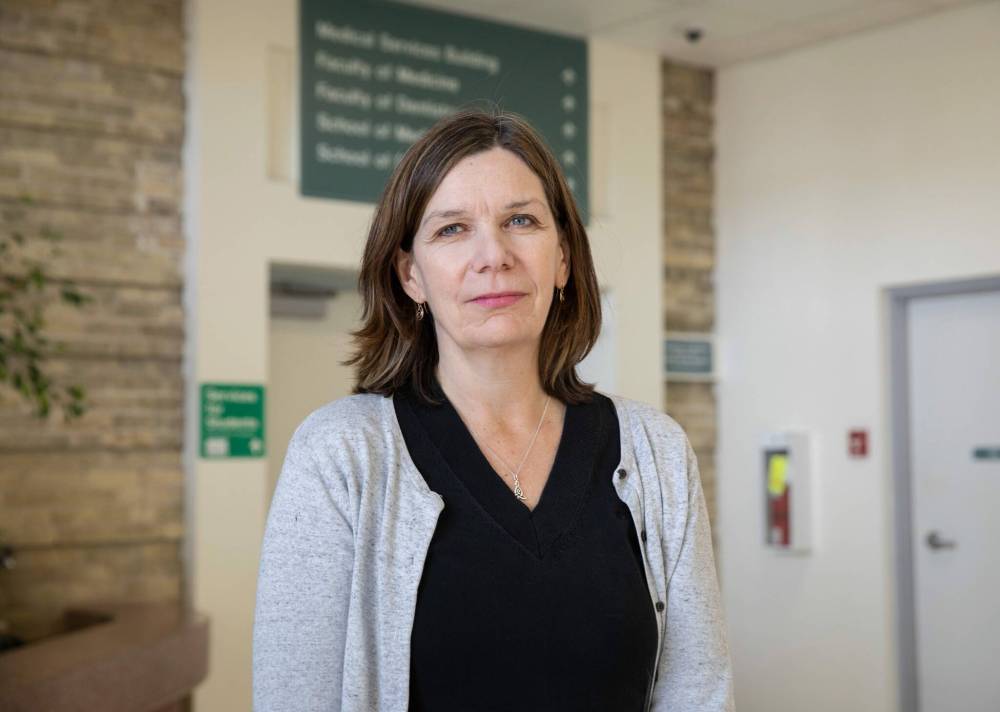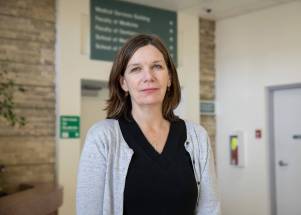Speak up, pay up to save lives, frustrated doctor urges province Addictions specialist calls for promotion, universal coverage of opioid replacement therapy in Manitoba
Read this article for free:
or
Already have an account? Log in here »
To continue reading, please subscribe:
Monthly Digital Subscription
$0 for the first 4 weeks*
- Enjoy unlimited reading on winnipegfreepress.com
- Read the E-Edition, our digital replica newspaper
- Access News Break, our award-winning app
- Play interactive puzzles
*No charge for 4 weeks then price increases to the regular rate of $19.00 plus GST every four weeks. Offer available to new and qualified returning subscribers only. Cancel any time.
Monthly Digital Subscription
$4.75/week*
- Enjoy unlimited reading on winnipegfreepress.com
- Read the E-Edition, our digital replica newspaper
- Access News Break, our award-winning app
- Play interactive puzzles
*Billed as $19 plus GST every four weeks. Cancel any time.
To continue reading, please subscribe:
Add Free Press access to your Brandon Sun subscription for only an additional
$1 for the first 4 weeks*
*Your next subscription payment will increase by $1.00 and you will be charged $16.99 plus GST for four weeks. After four weeks, your payment will increase to $23.99 plus GST every four weeks.
Read unlimited articles for free today:
or
Already have an account? Log in here »
Hey there, time traveller!
This article was published 24/11/2022 (1116 days ago), so information in it may no longer be current.
A Winnipeg family doctor who focuses on addictions medicine has decided she can no longer wait quietly for the province to do the right thing while fatal opioid overdoses soar to record levels.
Dr. Anne Durcan says Manitoba Health neither promotes nor covers the upfront costs of opioid replacement therapy using Suboxone and methadone, two medications she said have saved dozens of her patients’ lives and enabled them to live healthy, productive lives.
“We have to speak out,” said Durcan, who was named one of Canada’s top 10 family doctors in 2010 by the College of Family Physicians of Canada. “I don’t think there is movement being made on this.”
JESSICA LEE / WINNIPEG FREE PRESS Dr. Anne Durcan was named one of Canada’s top 10 family doctors in 2010 by the College of Family Physicians of Canada.
Manitoba reported a record 407 overdose death in 2021 and is on track to exceed that number this year.
Manitoba added Suboxone to its list of covered medications in 2017, but patients — unless they have drug coverage through Employment and Income Assistance or private insurance — must first go through the process of applying for Pharmacare and pay a deductible calculated on family income; the minimum is $100.
Durcan wants the entire cost of methadone and Suboxone covered up front so they’re available without any delay that could result in someone using a potentially lethal street drug while they wait for approval, as is the case in both Alberta and B.C.
And she and other doctors who focus on addictions medicine are calling for a public-awareness campaign about the availability of treatment.
“There’s like a lack of knowledge of where you can get this help and then there’s a lack of knowledge of how beneficial both Suboxone and methadone are for opiate addiction, but it really is life-saving”–Dr. Anne Durcan
It’s important for people to know there’s an alternative to being “dope sick” and having to seek relief from often unsafe and sometimes deadly street drugs.
“There’s like a lack of knowledge of where you can get this help and then there’s a lack of knowledge of how beneficial both Suboxone and methadone are for opiate addiction, but it really is life-saving,” she told the Free Press.
About OAT
The number of prescribers of “opioid agonist therapy” — the proper medical term for opioid replacement therapy — has increased exponentially in Manitoba in the last seven years, from nine physicians in 2015 to more than 180 doctors and and nurse practitioners in 2022.
There are 21 sites around the province providing OAT.
The number of prescribers of “opioid agonist therapy” — the proper medical term for opioid replacement therapy — has increased exponentially in Manitoba in the last seven years, from nine physicians in 2015 to more than 180 doctors and and nurse practitioners in 2022.
There are 21 sites around the province providing OAT.
Manitoba has six Rapid Access to Addictions Medicine clinics that provide assessment, counselling, referrals and prescriptions for a variety of medications, including those used in OAT. There are two RAAM clinics in Winnipeg, and one each in Selkirk, Brandon, Thompson and Portage la Prairie.
Winnipeg and Brandon have Manitoba Opioid Support and Treatment clinics that provide OAT along with counselling and support, health education and promotion, disease prevention education, needle exchanges and referrals to community-based supports and services.
Sources: National Institutes of Health, College of Physician and Surgeons of Manitoba, Province of Manitoba
— Carol Sanders
“It’s incredibly satisfying to see people be able to get their life back on track and get their lives moving in the direction that they wanted to go in. That’s why I feel so passionate about it.”
The province’s refusal to support safe-consumption sites — supervised, hygienic places set up to reduce potential harm for illegal drug users — has been in the news recently but little has been said about the drug-replacement therapy.
“It helps to do a promotion — just like you do promotion for condoms, or other public-health interventions,” Durcan said. “People often don’t talk about it, and if you don’t talk about it, you don’t talk about the treatment.”
Medication-assisted treatment uses opioids such as buprenorphine (Suboxone) and methadone to reduce withdrawal symptoms and reduce cravings for other, more dangerous opioids such as pain relievers, heroin and fentanyl. The therapy medications keep patients from craving drugs, which means they’re less likely to relapse.
“Suboxone is such a good medication, because people’s minds are quite clear. You’re not thinking about drugs…. You kind of quieten those receptors so that they’re not looking for anything and then you can just do your regular things,” said Durcan, who has been practising for nearly 30 years.
Opioid replacement allows people to safely get off harmful, addictive street drugs through witnessed dosing until there is evidence — via urine testing — that they’re free of opioids and can take the opioid replacement without supervision.
“It’s a medication, it’s a treatment,” she said.
“Suboxone is such a good medication, because people’s minds are quite clear. You’re not thinking about drugs…. You kind of quieten those receptors so that they’re not looking for anything and then you can just do your regular things.”–Dr. Anne Durcan
B.C. offers universal coverage for Suboxone and methadone, and in Alberta the cost is universally covered for up to six months, which gives people time to apply for coverage through social assistance or the Alberta Health Care Insurance Plan.
In both provinces, ability to pay up front isn’t an obstacle to getting therapy, Durcan said, adding treatment costs can be difficult for some to cover in Manitoba.
As an example, a patient requiring daily purchases from a pharmacy for an upper-range dose of Suboxone will pay $21.82, most of which (about $15) is the dispensing fee, she said.
A spokesperson for Health and Wellness Minister Sarah Guillemard — who is refusing to bend to increasingly louder calls for safe-consumption sites — said the province is looking at coverage in B.C. and Alberta.
“We are researching this concept to assess potential opportunities within Manitoba’s context,” Ross Romaniuk said in a statement.
carol.sanders@freepress.mb.ca

Our newsroom depends on a growing audience of readers to power our journalism. If you are not a paid reader, please consider becoming a subscriber.
Our newsroom depends on its audience of readers to power our journalism. Thank you for your support.







